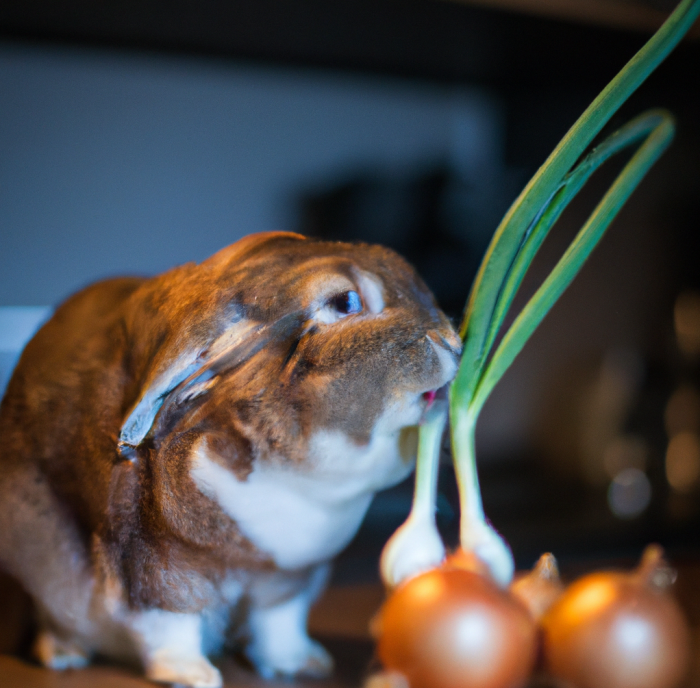Onions, a staple in human diets, have sparked curiosity about their suitability for our furry companions, rabbits. While rabbits primarily consume hay, fresh vegetables, and pellets, the question of whether onions can be incorporated into their diet remains.
This article delves into the nutritional benefits and potential risks associated with onion consumption by rabbits. We will explore safe onion consumption guidelines, identify suitable alternatives, and discuss additional considerations to ensure the well-being of your beloved rabbit.
Health Benefits of Onions for Rabbits
Onions offer various health benefits for rabbits due to their nutritional value. They are a rich source of vitamins, minerals, and antioxidants, which play a crucial role in maintaining a rabbit’s overall health and well-being.Onions contain essential vitamins such as vitamin C, which is vital for immune system support and wound healing.
They are also a good source of vitamin B6, which is involved in metabolism and the production of red blood cells. Additionally, onions provide minerals like potassium, which helps regulate blood pressure and fluid balance in the body.The antioxidants present in onions, such as quercetin and sulfur compounds, possess anti-inflammatory and antimicrobial properties.
These compounds help protect rabbits against oxidative stress and support a healthy immune system. Onions also contain prebiotics, which promote the growth of beneficial bacteria in the gut, aiding in digestion and overall gut health.
Risks Associated with Onion Consumption
While onions offer potential health benefits, it’s crucial to be aware of the risks associated with feeding them to rabbits. Onions contain compounds that can be toxic to rabbits, particularly thiosulfate.
Thiosulfate can cause oxidative damage to red blood cells, leading to a condition known as Heinz body anemia. This condition can result in a range of symptoms, including weakness, lethargy, and pale gums.
Symptoms of Onion Poisoning
If a rabbit ingests a significant amount of onion, it may exhibit symptoms of onion poisoning, such as:
- Vomiting
- Diarrhea
- Respiratory distress
- Weakness
- Lethargy
- Pale gums
- Heinz body anemia
Safe Onion Consumption Guidelines

To ensure the safety of rabbits consuming onions, it is crucial to adhere to specific guidelines. These guidelines establish appropriate portion sizes, feeding frequency, and monitoring practices to minimize potential adverse reactions.
Appropriate Portion Size: Onions should be offered in very small quantities, not exceeding 1-2 teaspoons per week for an average-sized rabbit. This amount provides trace amounts of beneficial nutrients without posing significant health risks.
Frequency of Onion Feeding
To prevent digestive upset or other health issues, onions should be fed infrequently. Limit onion consumption to once every 1-2 weeks, allowing ample time for the rabbit’s digestive system to adjust.
Monitoring Rabbits After Onion Consumption
After feeding onions to rabbits, it is essential to monitor their behavior and overall health closely. Observe for any signs of discomfort, such as changes in appetite, lethargy, or gastrointestinal distress. If any adverse reactions occur, discontinue onion consumption and consult a veterinarian promptly.
Alternatives to Onions for Rabbit Diets
Onions are not recommended for rabbits due to their high sulfur content. However, there are several other vegetables and fruits that can provide similar nutritional benefits without the potential risks associated with onions.These alternatives are rich in vitamins, minerals, and antioxidants, essential for maintaining a healthy rabbit.
They also offer a variety of flavors and textures, ensuring a balanced and enjoyable diet for your furry friend.
Suitable Alternatives
- Carrots: Rich in vitamin A, essential for vision and immune system health.
- Celery: Low in calories and high in fiber, aiding digestion and promoting dental health.
- Apples: Contain vitamin C, an antioxidant that supports the immune system and skin health.
- Bananas: Provide potassium, important for heart and muscle function.
- Berries (e.g., strawberries, blueberries): Excellent sources of antioxidants, protecting against cell damage.
Additional Considerations
When introducing onions into a rabbit’s diet, several additional factors should be considered to ensure the animal’s well-being.
The age, breed, and health status of a rabbit can influence its tolerance to onions. Younger rabbits may be more sensitive to the effects of onions than older rabbits. Certain breeds may also have a higher tolerance for onions than others.
Rabbits with underlying health conditions, such as kidney or liver disease, should avoid consuming onions altogether.
Introducing Onions Gradually
To minimize the risk of digestive upset, onions should be introduced into a rabbit’s diet gradually. Start by offering a small piece of onion, no larger than a pea, and monitor the rabbit for any adverse reactions. If the rabbit tolerates the onion well, the amount can be gradually increased over time.
Last Recap
In conclusion, while onions offer certain nutritional benefits, their potential toxicity warrants caution when feeding them to rabbits. Adhering to safe consumption guidelines and monitoring rabbits closely after onion ingestion is crucial. If you seek alternatives, consult with your veterinarian to determine the most suitable options for your rabbit’s specific dietary needs.
Frequently Asked Questions
Can rabbits eat onions?
Yes, rabbits can consume onions in moderation, but only specific parts and under strict guidelines.
What parts of the onion can rabbits eat?
Rabbits can only eat the white or yellow flesh of the onion in small quantities.
How often can rabbits eat onions?
Onions should be offered as an occasional treat, no more than once or twice a month.
What are the risks of feeding onions to rabbits?
Onions contain thiosulfate, which can be toxic to rabbits in large amounts, causing digestive upset, vomiting, and respiratory distress.
What are some alternatives to onions for rabbits?
Suitable alternatives include carrots, celery, bell peppers, and dandelion greens, which provide similar nutritional benefits without the risks associated with onions.